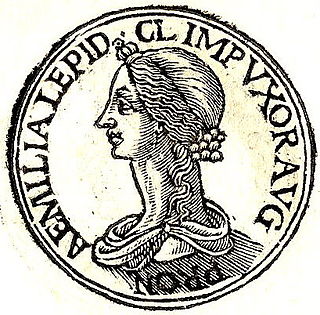Related Research Articles
Servilia was a Roman matron from a distinguished family, the Servilii Caepiones. She was the daughter of Quintus Servilius Caepio and Livia, thus the half-sister of Cato the Younger. She married Marcus Junius Brutus, they had a son, the Brutus who would assassinate Caesar. After her first husband's death in 77, she married Decimus Junius Silanus, and with him had a son and three daughters.

Publius Cornelius Dolabella was a Roman senator active during the Principate. He was consul in AD 10 with Gaius Junius Silanus as his colleague. Dolabella is known for having reconstructed the Arch of Dolabella in Rome in AD 10, together with his co-consul Junius Silanus. Later, Nero used it for his aqueduct to the Caelian Hill.

The gens Junia was one of the most celebrated families of ancient Rome. The gens may originally have been patrician, and was already prominent in the last days of the Roman monarchy. Lucius Junius Brutus was the nephew of Lucius Tarquinius Superbus, the seventh and last King of Rome, and on the expulsion of Tarquin in 509 BC, he became one of the first consuls of the Roman Republic.
Marcus Atius Balbus was a 1st-century BC Roman who served as a praetor in 62 BC, he was a cousin of the general Pompey on his mother's side and a brother-in-law of the Dictator Julius Caesar through his marriage to Caesar's sister Julia Minor. Through Julia he became the maternal grandfather of Augustus the first Roman Emperor.
Lucius Aemilius Paullus was the son of Paullus Aemilius Lepidus and Cornelia, the elder daughter of Scribonia. He was married to Julia the Younger, the eldest granddaughter of the Emperor Augustus.
Appius Junius Silanus, whom Cassius Dio calls Gaius Appius Silanus, was consul in AD 28, with Publius Silius Nerva as his colleague. He was accused of majestas, or treason, in AD 32 along with a number of senators, but he and Gaius Calvisius Sabinus were saved by one of the informers, Celsus, a tribune of a city cohort.

Julia Minor was the second of two daughters of Gaius Julius Caesar and Aurelia. She was an elder sister of the dictator Julius Caesar, and the maternal grandmother of Rome's first emperor Augustus.
Decimus Junius Silanus was a consul of the Roman Republic. He may have been the son of Marcus Junius Silanus, consul in 109 BC. He was the stepfather of Marcus Junius Brutus, having married Brutus' mother, Servilia.
Gnaeus Cornelius Lentulus Gaetulicus was a Roman senator and general. He was ordinary consul in the year 26 with Gaius Calvisius Sabinus as his colleague. Gaetulicus was involved in a plot against the emperor Caligula, and following its discovery he was executed.

Aemilia Lepida was a noble Roman woman and matron. She was the first great-grandchild of the Emperor Augustus.
Marcus Junius C. f. M. n. Silanus was an Ancient Roman senator who became suffect consul in AD 15. His daughter Junia Claudilla was the first wife of Emperor Caligula.
Gaius Furnius was a Roman senator during the reign of Augustus, and consul in 17 BC with Gaius Junius Silanus as his colleague.
Gaius Calvisius Sabinus was a Roman Senator, who was consul in AD 26 as the colleague of Gnaeus Cornelius Lentulus Gaetulicus. During the reign of Caligula, he was accused of conspiring against the emperor, and took his own life rather than submit to a trial.
Marcus Junius D. f. M. n. Silanus was a Roman senator and consul in 25 BC as the colleague of Gaius Julius Caesar Octavianus, the emperor Augustus.
Marcus Junius M. f. M. n. Silanus Torquatus was a Roman senator. He was consul in AD 19, with Lucius Norbanus Balbus as his colleague.
Gaius Junius Silanus was a Roman Senator active during the reigns of Augustus and Tiberius. He acceded to the rank of Roman consul in 10 AD as the colleague of Publius Cornelius Dolabella. For the term 20/21 the sortition selected him to be proconsul of Asia. However, upon his return to Rome in 22 he was accused of malversation (misconduct). To this alleged crime his accusers in the senate added the charges of treason (majestas) and sacrilege to the divinity of Augustus.
Marcus Appuleius was a nephew of the Roman emperor Augustus and Roman consul in 20 BC with Publius Silius Nerva as his colleague.
Lucius Norbanus Balbus was a Roman senator during the Principate. He was consul in AD 19, as the colleague of Marcus Junius Silanus Torquatus. Balbus was the younger son of Gaius Norbanus Flaccus; his brother was the consul of AD 15, Gaius Norbanus Flaccus.
Gaius Julius Silanus was a Roman senator and general who held a series of offices in the emperor's service. He was suffect consul for the nundinium of January to April 92 as the colleague of Quintus Junius Arulenus Rusticus. Silanus is known solely through inscriptions.
References
- ↑ Attilio Degrassi, I fasti consolari dell'Impero Romano dal 30 avanti Cristo al 613 dopo Cristo (Rome, 1952), p. 4
- ↑ Syme, pp. 190f
- ↑ Syme, p. 191
- ↑ Syme, p. 190